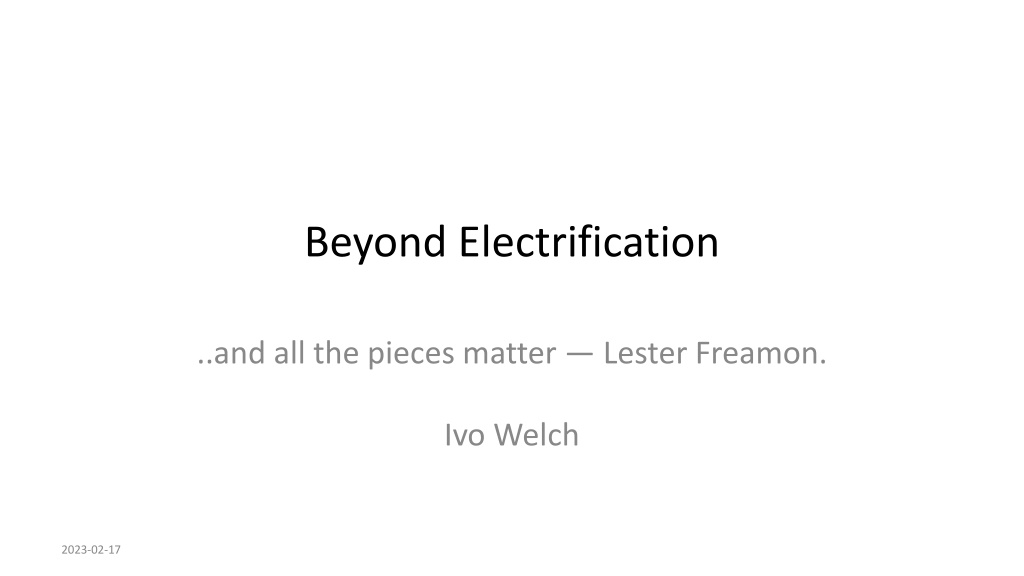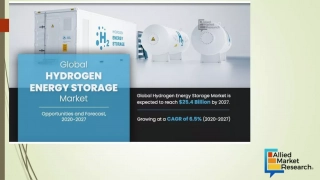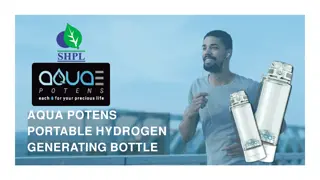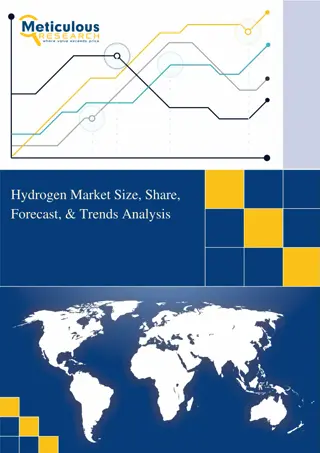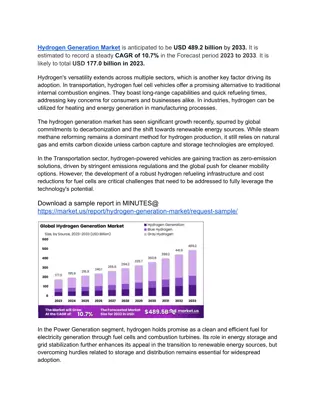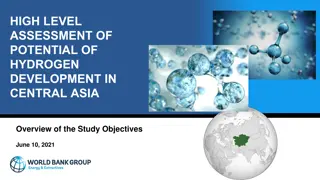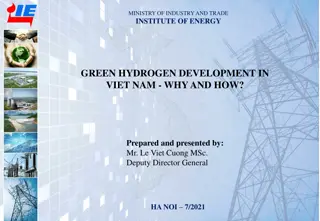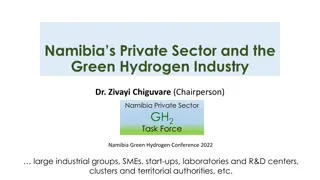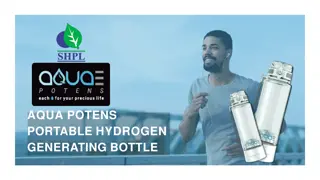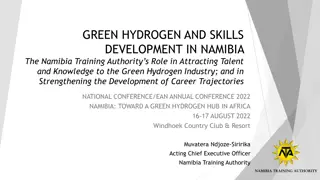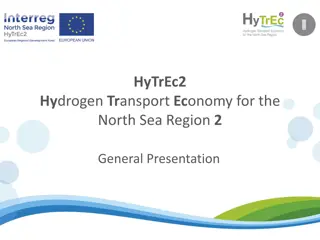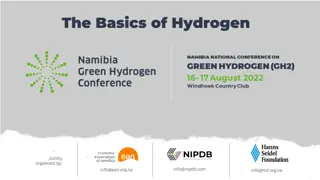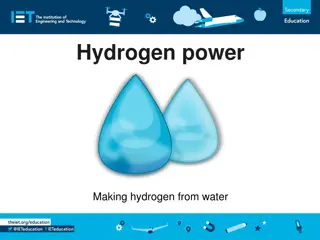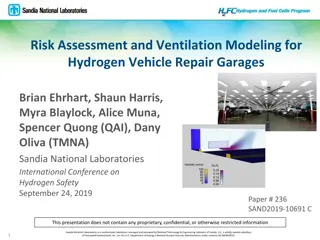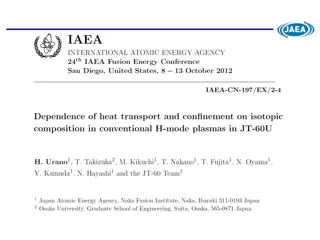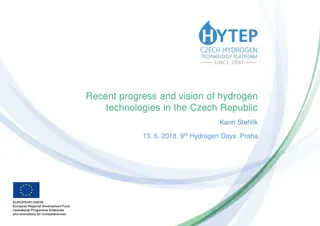The Future of Hydrogen: Opportunities and Challenges
Exploring the potential of hydrogen as an energy carrier beyond electrification. Discusses differences in weight and density compared to fossil fuels, production costs, potential future uses in transportation and off-grid applications, and the debate over its competitiveness against batteries. Considers the role of renewable energy sources in shaping the future energy landscape.
Download Presentation

Please find below an Image/Link to download the presentation.
The content on the website is provided AS IS for your information and personal use only. It may not be sold, licensed, or shared on other websites without obtaining consent from the author. Download presentation by click this link. If you encounter any issues during the download, it is possible that the publisher has removed the file from their server.
E N D
Presentation Transcript
Beyond Electrification ..and all the pieces matter Lester Freamon. Ivo Welch 2023-02-17
Hydrogen: Differences Three times as heavy as fossil fuels. One-quarter as dense as fossil fuels. Need to design new airplanes Airbus is on it. Transportable like natgas, but more corrosive.
Hydrogen: Production Cost Cost, $ per MWh: Natgas Benchmark: $20 Hydrogen, $ per MWh: Brown (From NatGas): $27 Blue (With Capture): $85 Green (From Electrolysis): $130
Green Hydrogen Future? In 30 Years: $30/MWh (?) Natgas only a little cheaper? or maybe not even? Maybe catalyst breakthroughs?! Competitive against natgas?! May depend on location, too. hydrogen needs no special natgas reservoirs.
Green Hydrogen Future? Speculating on hydrogen is speculating on: 1. Intermittent energy becomes nearly free. Facilitates cheap hydrogen. 2. Energy storage remains expensive. Batteries can t do most jobs better.
Green Hydrogen Future? Competitive against batteries? Cheaper solar electricity will also reduce cost of battery-stored electricity. Ionic bonds absorb and release energy easier than chemical covalent bonds. Batteries fixed cost may not scale easily, but batteries are in front of the cost curve. Wires are limited transport technology. Hydrogen from Saudi to Europe?!
Hydrogen: Likely Future Uses Transportation, off-grid: Almost surely ships and planes. Maybe trucks, but we can disagree. Hydrogen for seasonal energy storage: Unlikely for a long time. Speculates on lack of progress in batteries. H already also used for fertilizer production.
Hydrogen: Less Likely Futures Any uses suitably satisfied with limited battery capacity: Batteries will likely always be more efficient. Think less resistance both in and out; Cheap solar energy reduces cost, too. Batteries will recharge within minutes. Batteries will improve greatly, too. What do you think? Near-grid transportation?
Hydrogens Kinetic Problem Assume that hydrolysis is free and we have already have the input energy here. Efficiency of hydrogen for kinetic power: 40% with a fuel cell first making electricity; 30% with a piston combustion heat engine. Efficiency of battery: 75%.
Hydrogen: Stupid Ideas, Heat Use electricity first to make hydrogen, then burn it to make heat. Instead, just make heat with electricity. Think electric arc furnace. Avoids hydrogen roundtrip. Would you make hydrogen to immediately burn it??
Green Hydrogen Future? Invest?? Where can hydrogen replace natgas? Where can hydrogen replace batteries? Green hydrogen for storage, transportation, etc., may not happen for decades, if ever.
Industrial, Steel, Cement Tough to replace fossil fuels for heat. Fossil fuels are one-trick ponies, and this is their trick! Industrial heat will probably be the last bastion of fossil fuels. Also, this discussion has omitted important issues on steel, cement, etc.
Agriculture Most models identify agricultural yields as primary cost of CC?! Seems pessimistic, like early clean-tech forecasts. Boffins are decoding life now. There is a lot we may be able to do. But it s not certain.
Agricultural Emissions About 20% of global GHG today. Methane is especially bad: Lots of methane From rice and cattle. Richer people like beef and milk, so their consumption will increase. Farmers also overuse nitrogen. Unrealistic: tax fertilizers more.
Agriculture Farmers are not stupid! They tend to be conservative, and they are politically very powerful. Farming is Result of millennia of improvements. Large and decentralized. Cut-throat business. Appeal to social or ecological conscience.
Ag Progress I Ag should be able to improve: Ag will need many different solutions, e.g., Asparagopsis, flooding, tilling, etc. Technology is progressing, too: GMO and CRISPR/Cas9 are promising, especially for poor country crops. Cut-throat business favors efficiency if more efficient to pollute (conflict-of-interest disclosure)
Ag Progress Ii Stupid environmentalism can cause big unnecessary environmental problems. Humanity cannot go back to nature! Boffins can reduce ecological problems! Chemicals are necessary to feed humanity, but created many environmental problems. Biotech now can be on side of environmentalism.
Ag Progress Ii Newer better foods need consumer acceptance. Do not bless non-sense food labels. Natural foods , my . Can natural foods use pesticides? Cyanide is natural, too Is genetic modification intrinsically bad? What do you think you are eating today? How do you think you arose?
Disclaimer Good reasons to oppose many farm practices: Such as inhumane animal farming. But please don t oppose better crops. Good reasons to be careful, too: New technologies may have risks. Very unlikely. (Make boffins eat!) External application of chemicals more likely more harmful to people and environment. Personally, I pay extra for humanely farmed animals, but I have no illusions that this will change the world.
More Earth Solutions Food waste Landfills USA Specific Cut stupid ethanol subsidies immediately. Each gallon of ethanol uses more than a gallon of diesel.
Methane Not just USA or OECD problem. Often from oil&gas operations standard o&g mode is don t cap, sell off. end-of-life deposits are ridiculously low. Needs stronger penalties, incl. at EOL. reach-back liability? Needs constant measuring of emissions. easy satellite detection! Needs resistance to lobbying, hardest to manage, given reality.
Yet Others Lots of mundane stuff. For example: Improve insulation: incentives, guarantees, financing. Thermal energy storage. Heat pumps: 400% efficiency!
Conclusion Energy from fossil fuels is the world s biggest pollution issue. Don t be too bullish on hydrogen, but hydrogen will likely play a role. Many other GHG emissions need clean solutions, too. Humanity can tackle agricultural & food emissions better.
